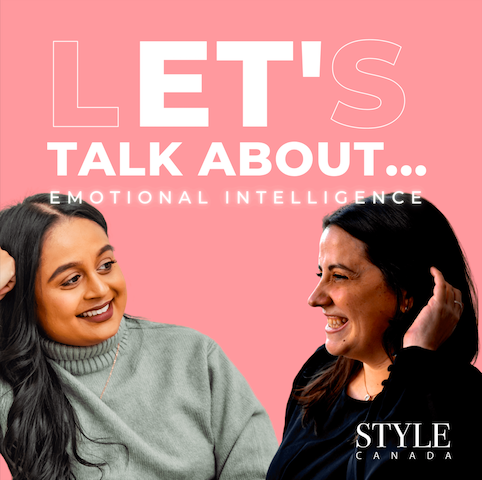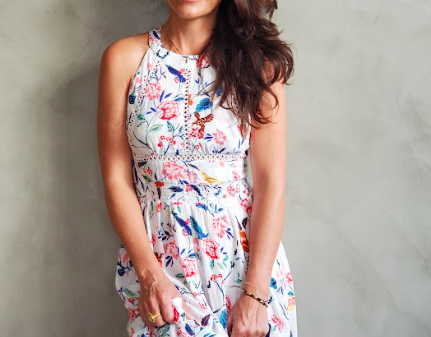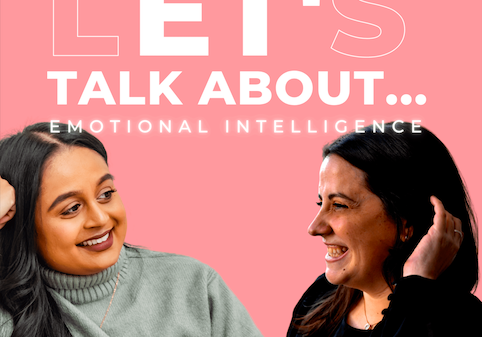On this week’s episode of Let’s Talk About…, Elise sits down with co-host Sarah Joseph to talk about relationship conflict and conditional love.
Sarah is a certified emotional intelligence coach whose mission is to help you get comfortable with your emotions and master them to live a more purposeful life. She understands how our lack of emotional management can impact the longevity of our relationships and can inspire our emotional healing by plugging into our most powerful tool, the Mind. Her philosophy is that our emotions show up in every aspect of our lives and it’s your right to learn how to manage them effectively to your advantage.
On this week’s episode, Elise and Sarah talk about relationship conflict, silent treatment, conditional love, and ways to deal with conflict.
“If you can track back your own feelings and emotions to be able to understand the storyline you are coming from, you’ll be able to communicate with your partner 10 times more effectively than if you had just went to your friend ranted about how you felt.” Sarah tells Elise on Let’s Talk About.
Check out our show’s full transcript below.
[00:00:00] Elise: Hi everyone, and welcome. This week let’s talk all about relationship conflict and the silent treatment. Hi Sarah. Thanks so much for joining us this week.
[00:00:13] Sarah: Hi, Elise. I’m so excited for this week’s topic.
[00:00:17] Elise: Yeah, so we’re continuing our series on emotional intelligence. We have Sarah Joseph, emotional intelligence coach with us.
Again, this week’s episode is a little bit different of a format. We’ve started to ask our audience for some questions, and if anyone does have a question, they can email that to us at [email protected] um, and so this is gonna be a little different in that we’re taking an audience question, gonna kind of dissect it.
Um, Sarah’s gonna provide some solutions. We’ll have a little conversation around it. Yeah. And so this topic happens to be on relationship conflict, and there’s a little bit of silent treatment mixed in there too. Mm-hmm. Um, so excited to get your take. So I’ll start off by reading the question and then we can kind of dissect section by section of it.
[00:01:07] Sarah: Sounds good.
[00:01:07] Elise: Sounds good? Yeah. Okay, great. So this is from Emma. Hi Sarah. And Elise, I’ve been loving your podcast recently and it’s really helped me notice the emotional patterns in my relationship. Oh, yay. I’m so glad to hear that. Uh, that was me. That wasn’t Emma saying that. , back to Emma now, just for context.
I’ve been a relationship with my partner for the last six years now, and we have our ups and downs. Like any couple, I notice every time we argue or get into a fight, he treats me differently after, and it’s like I become a stranger to him. He stops talking to me and can ignore me for days or even weeks.
He’ll stop talking, taking me out, or planning dates. He won’t check in on me or love me the same, and this can go on for months until another blowup happens. I know he’s probably hurting and needs his space, but when this happens, I feel all alone and I start to blame myself for the relationship going wrong.
I need some advice, please help! So Sarah, I feel like there’s lots to digest.
[00:02:03] Sarah: Wow. Yeah. Um, that is a lot to digest, but I wanted to thank Emma for sending in that message because that was so vulnerable and that takes a lot to be able to, you know, create that, safety within yourself to. Send out a message like that.
And I absolutely love this question and I love that the podcast is helping. Um, yeah, that’s everyone. We wanna make sure everyone’s, you know, increasing their emotional intelligence and feeling better in their emotions, and that’s really good that this podcast has been helping you. So thank you for that feedback, Emma.
I really appreciate it. Sure. So great question. And it’s really, really common. In all of most relationships, at least where we get into fights and they’re not really well resolved, and then it can lead one party to, you know, ignoring you or, you know, not reciprocating the love that they used to. So there’s a few things that kind of, you know, trickle in here.
And the one thing that I noticed the most, um, uh, is the silent treatment where he’s ignoring you and he’s not speaking to you for days or even weeks.
[00:03:05] Elise: I guess that was a thing that struck me was I totally understand and I think there’s so much value in taking a breather after an argument, waiting a day, waiting a couple days maybe, but, and I’m sure you’ll get into this, this like weeks and then months till the next blow up like that.
Just the way that’s written, it sounds like to me. They’re having a fight and then silent and then they’re having another fight and then si like, I would hope it wouldn’t be that. Mm-hmm. Um, but, we don’t have that, that’s the thing with, we don’t have, we don’t have the total picture. But, um, yeah, that just, that struck me I guess in reading.
[00:03:47] Sarah: Yeah, no, same here. And it’s definitely why I wanna talk about the silent treatment first and then trickle into the sub or kind of those root, um, causes there.
Uh, so in terms of the silent treatment, I guess a lot of us don’t know that it’s actually a form of abuse, right? To not. Speak to someone for, that you have spoken to for days, weeks, even months, right? So that’s just something to kind of keep on your radar, um, as you’re going through relationships in general.
So in terms of the silent treatment, I know this well from just personal experience, um, just. Being, you know, a child growing up with parents who kind of use the silent treatment in order to, you know, as a form of punishment in order to, you know, say that you did something bad or that you did something wrong.
And that’s kind of seems what’s come, what’s happening in the relationship now as well. So they, I know my parents wouldn’t talk to me for like days maybe. Maybe not months, but definitely days, and you could definitely see the treatment that was maybe different between me and my sibling, for example, right?
If I, you know, maybe brought home a bad grade or maybe I did something that they didn’t like, or I just. Conveyed some type of misbehavior. What would happen is they, my mom specifically would just, just stop talking to me, right? And um, or there’d be a blow up and then stop talking to me. And then after that, it would really increase my feelings of all of this self-doubt and this self blame.
And then, A lot of rejection and those feelings of I’m not good enough, and then those feelings of abandonment really, really, you know, took form at those really young ages, and then even now, right into relationships now. So really learning how to heal that part of myself is something that has been a part of my healing journey for a long time.
But, I guess a lot of us don’t realize that it also comes from childhood. It stems from those really core areas of life. So why do we even begin to use the silent treatment? You know, it’s kind of one of those questions that come up. Why do we use it? And essentially how I like to break it down is we use it as a form of with a drawing.
Our love for someone, right? Or in order. Flick some type of pain or punishment towards someone else. And it’s usually the people that we love. Um, and if we’re withdrawing our love, that leads me to our second issue, which is conditional love. And this seems to be a really big thing in a lot of relationships and it, most people say it stems from families and um, Parent child relationships, and that’s kind of the origin of it and how it stems into your relationship moving forward.
It can appear in so many ways, and it sounds like it’s appearing in this specific context as well, so conditional love. I guess you could say is where your love comes with a lot of strings attached, right? And it’s love on condition, in on the condition that you behave a certain way, right? Mm-hmm. So if you do this, if you behave this way, then I’ll love you, right?
I’ll take you out, I’ll, you know, take you on dates. I’ll love you the same, right? It’s kind of the, the wording that she used there. So maybe in that fight that happened prior it was, you did this wrong thing that I don’t like and now I’m gonna withdraw my love for you in order to punish you in order to inflict some type of pain.
Right. So that you feel the way I feel, for example, I for an I. Right. And it creates such an unhealthy dynamic, especially if there seems to be a lack of communication as well.
[00:07:23] Elise: Yeah. Yeah. I mean, I feel interesting. So I never thought of it as. Um, a four, it makes sense that it would be withdrawing your love.
Mm-hmm. Never thought of it as a form of abuse. Mm-hmm. I guess I almost thought of the silent treatment for a short amount of time in a bit of a positive because on my, like if I’m giving the silent treatment, I thought of it as a time to like collect my thoughts. But I guess there’s a, there’s a time.
You tell me, is there a time when it’s no longer that other person in the conflict taking the space they do truly need, like Emma mentioned in her email that like he, he’s probably hurting as well. So is there like a timeline like is it 24 hours, is it 48 hours, where it then just kind of becomes like more than that person needing time to collect their.
[00:08:18] Sarah: Yeah. And there’s absolutely nothing wrong with needing time for yourself to collect your thoughts, right? Mm-hmm. There’s absolutely nothing wrong with needing some time to process what just happened, right? So that you can then communicate your needs and value effectively, right? But what I. Disagree with is completely cutting off the person, abandoning them completely and not letting them know that, hey, you’re taking the next 24 hours to process your thinking so that you can communicate effectively.
Right? And we can get into that in the, like the solutions and stuff. But I definitely think there is a line that is being crossed when we’re going You. Days upon days upon days not getting back to the person, right? And then right. Treating them completely differently so that they get the message right.
Versus saying, Hey, I need to take a little bit of time to process what I feel. I still love you. I still care about you. This is not me, you know, rejecting you or breaking up with you right now. I just need some time to collect my thoughts because right now I’m not feeling very loving. Right? Right now, I don’t feel like I can be the best version of me in the relationship, and I need to take a few minutes to digest and collect my thinking so that I can.
You know, be able to be there for us, right? And be there. I need to be there for myself first. So I don’t think a lot of people are able to communicate
[00:09:42] Elise: that first. That’s what I was just gonna say, that comment you made about communication, it’s like really just how you just said that so perfectly, like communicating that that’s what you in conflict maybe need.
And then the silent treatment doesn’t feel. The same to, to the other person. Right. Like it’s, it makes more, it gives context to it, essentially.
[00:10:03] Sarah: Exactly. Exactly. Ok, so the other part of. The silent treatment or this conditional love per se, is that abuse of power, right? And that sense of abuse of power. It’s, it’s kind of like dangling candy in front of a child and saying, well, if you don’t do this thing right, or if you behave this way, you’re not.
Getting this candy and I have the power to take it away, right? So I have the power to take away this love that I have for you each and every time that you do something that I’m not okay with, right? Or each and every time that you hurt me, I’m gonna do X, Y, and Z back to you. And that can really damage a relationship over time.
Um, only because no one wants to be, you know, wants their love taken away from them. Right. The core value of that every human being is chasing, is to be loved, is to feel love, right? And then to hold that over someone’s head that, uh, Does not only, you know, affect the relationship, but it affects the way that you see other people and how you view the world, right?
So it’s kind of a dangerous territory to play in, right? Mm-hmm. So be mindful of when, you know, there you are in a relationship where you’re receiving a lot of conditional love, right? So maybe after that fight, if. Speaking to you or he’s not, you know, treating you with love or not taking you out anymore.
It seems like that love is conditional on the type of behavior that he is expecting from you, right? Or maybe he is in his hurt feelings, right? And he needs some time to collect his thoughts. But if after collecting your thoughts, you’re still treating someone disrespectfully, right? Or not the way that you would if you said that you’ve loved them, how they’ve been treated in the past, that’s also a red flag to look out.
[00:11:49] Elise: It’s interesting that, I mean, I feel for Emma because I, I think it’d be very hard in a relationship of conditional love, right? Like, Hmm. When you think in any, any relationship, friendship, parent, parental, sibling, whatever, where you feel like you could always be taken away, right? Yeah. Like that feeling of like, oh, this love is fragile.
Fragile. Mm-hmm. And it could be taken from me at every, any. That must be a really exhausting place to be in, cuz you’re always watching your moves, right? Like, yeah. Yeah. I don’t know if there’s any, yeah, sorry,
[00:12:29] Sarah: go ahead. What further comes out of that is, If that love can be so easily taken away, what that instills in you is fear of love being taken from you.
Mm-hmm. Right? So now you’re not only feeling abandoned and rejected, but you’re feeling scared to even, you know, make a mistake to accidentally say something that might hurt them. Now you’re walking on eggshells, right? In order to maintain this level of behavior or expectation that they expect from you.
And you almost become a people pleaser, right? You behave in a way which masks who you truly are, right? And you behave in this way in order to meet their needs and expectations, which eventually leaves you feeling numb inside, right? It makes you feel feeling so hollow.
[00:13:18] Elise: I would imagine one time this happening, two times this happening, maybe there’s like, Spac, but over this, Emma mentioned they were in this relationship for six years.
I’d imagine over, probably doesn’t even take six years to get there. I would imagine over a year, two years, you start to feel like not only that but feelings of like unworthiness and everything that you mentioned plus, right? Um, uh, it’s a lot. That’s, it’s funny be, it’s not funny, but it’s interesting because it’s like an issue.
And you tell me if this is true of relationships, something happening once or twice, you can kind of bounce back from, right? Mm-hmm. But like it’s repeated, is it the repeated behavior and the breakdown of a relationship? My, my assumption is that happens chips away. It’s like a chip away at something, right?
So if this happened once or twice, I could bounce back potentially, but if this is happening like over years and years, that’s where you just get worn down as a human, I’m guessing.
[00:14:19] Sarah: Yeah, of course. Right. And that takes a toll on you more and more. Right. And I think the biggest reason why relationship issues kind of continue, Repeatedly, even after a blowup or after a fight, um, is more or less because one of the parties, or both, I would say both of the parties have not learned the lesson, right?
There was something that needed to be learned the last 50 times this happened, or the last 20 times this happened, but it just wasn’t learned. So the recurrence of this issue was going to keep popping up between the two of you and individually. Until the both of you and I mean, both of you come together and figure out where you’re getting it wrong.
Right? And it’s not to say that it’s just one person because this is a partnership, right? Mm-hmm. If there is a conflict in a relationship, it’s coming from two people. It’s not coming from one person alone, right? They’re struggling with their own story. You were struggling with your own story, and the way that they, you know, attach together can be probably really triggering, right?
So there’s an underlining. Issue here that isn’t being resolved and it results in this specific type of behavior, which is the abandonment, the rejection, the, you know, not taking you out, the not dating you, not loving you the same, not speaking to you and ignoring you. There is something before that that has happened way before that, that triggered the onset of all of this.
It’s not to say that any of this behavior is okay, right? But be mindful of where it’s happening. How it’s happening, and notice where the lessons have not been learned. What am I missing here? Right? Just get curious with it. Why do we keep running into this roadblock? Right? What is missing here? And if you do not have the solutions, seek the solutions outside of you.
Right? All I know, a lot of the times when I’ve struggled with. Interpersonal relationship issues or just relationship issues with myself. Um, if I never had the answers and I couldn’t find it within myself to create a solution because I was too blocked by my own emotions and thoughts and stories, reaching out outside of myself really helped to bring in that third party perspective.
And I’m not saying you gotta go chat to your girlfriends and chat to this one and that one, and then, you know, spread a whole bunch of stuff about. This person that you clearly love, right? But what you can do is look for ways that you can create meaningful solutions. How can somebody help me? That’s reaching out to a therapist, that’s reaching out to a coach, that’s reaching out to a mentor, maybe, or someone, or a friend of yours that maybe is in a relationship that can understand you, right?
So understanding that there are parts here in which you’re missing that you might need to put the pieces together. Together, right? Mm-hmm. In order to create the bigger.
[00:17:11] Elise: So is that really, and there’s something that you said that I wanna go back to in a second, but is that like the big takeaway for Emma is like, find out what is creating this constant kind of behavior.
Because I’m sure the conflict each time is on something potentially different, right? Like the fight could be about something different each time. Um, so is, you mentioned that, you know, whether it’s seeking therapy, whether it’s seeking a coach, You also mentioned there maybe not going to like your group of friends, which I think is really interesting because mm-hmm.
And this is a little bit more on the like relationship conflict side, I guess, than silent treatment or conditional love, but to what extent do you think sharing your issues with your, in any relat. With your wider group of friends, et cetera. Like sometimes I think that that could actually snowball the problem because we have friends that are not like in the situation or you know, have studied.
Psychosocial work have studied emotional intelligence that really just love you and if you are mad, you know they’re gonna take team you and that other person’s a terrible person. So like what, can you say a little bit about, you know, resolving relationship conflict and maybe leaving out some of the.
The, the people you might have gone to in the past in that conversation. Like what does, what does that look like? It’s probably more, to your point, going to like a non-biased third party is what it sounded like when you answer to, to go to,
[00:18:52] Sarah: yeah. Yeah, exactly. Um, and yeah, it’s not to say that you can’t reach out to your friends that are supportive, right.
Also looking at making sure you’re being aware of who specifically you’re going to, right? Mm-hmm. Is also another really key element there. What I would definitely recommend is Al allowing yourself to have the first point of contact. In most cases, your partner, right? When you are struggling and going through, you know, something e either within yourself or in the relationship that your partner, you know, gets the respect of being the person that knows first, right?
But let’s say there is something that you want to go to your partner with, but you just don’t know how to say it. You don’t know how to bring it up to them because it always leads to a fight, right? It, or it always leads to. You know, negative thinking. What I would advise you to do is use the self-coaching model that we have, you know, throughout our podcast, which is, how do I diagnose my thoughts and my feelings, and what is the cir like, what is the outcome?
And. What is, how is, how is that affecting my life currently? Right? Or what are the actions I’m taking that are affecting my life currently? If you can track back your own feelings and emotions to be able to understand the storyline you are coming from, you’ll be able to communicate with your partner 10 times more effectively than if you had just went to your friend ranted about how you felt, right?
A lot of us do need to get out. You know, the anger, resentment, or sadness that we’re feeling. But once we’re done that, what do you do next? Right? Are you effectively talking to your friend about solutions that’s not requiring you to just break up with them, right? Mm-hmm. Because a of time, ours, You know, some of the time our issues are fixable.
Right? But then there are times where you’re dealing with way of different issues, but your friends really can’t help you with, right? Yeah, that’s true too. So being able to contact a professional would be great because they can give you the tools, the resources, and the skills to create the safety within yourself to communicate your thoughts and feelings, or to leave the relationship if that’s where this is going, right?
Mm-hmm. But it gives you the oppor, you have so many opportunities available to you, and I think a lot of. You know, and we can do another, you know, podcast on all of this. But asking for help is a place where a lot of us shy away from when it comes to our relationships. It’s like, if I am not getting this perfectly and I don’t know how to do this perfectly, What are other people gonna think of me, right?
What are other people gonna think of my relationship? So some people don’t even express anything, not only to their partners, but their friends, right? And people close to them because of how ashamed they are of what people will think of them. So be mindful of when that’s coming up to, right? And notice where that might be hindering you in your growth and in your relationship as a whole.
[00:21:40] Elise: So in terms of. Like summarizing for, for Emma, it’s that first the conversation with yourself for next steps. She can take conversations for yourself. Where is my emotions at? We’re going through the five steps there. Conversation with your partner. Mm-hmm. And then bringing it to like a third party, whether that’s like a non-biased friend, whether that’s a psychologist, social worker, therapist, a coach, et cetera.
[00:22:06] Sarah: Yeah. Okay. And I mean, maybe you don’t necessarily ask your partner to do couples therapy right away, right? Mm-hmm. But maybe indulgent therapy on your own, right? Because a lot of the solutions, a lot of the solutions can come from within ourselves, right? If one person is able to understand what they’re feeling, it can effectively help and inspire the other person to go through that healing process as well, right?
So instead of going, well, we can’t figure this out, so we need a couples therapy, right? We need to go into couples therapy, right? Understanding that that is an option. But if they’re saying no, well then there are still options for you, right? And the options are that you can seek help, that you can find a way to communicate your thoughts and feelings more effectively, and you can grow individually to notice how you can evolve not only yourself, but the relationship.
And if things, you know, don’t end up where you. Where you want it to be? Well, there’s decisions that you can make, you know, within there as well that you can seek help for. Say that it, if it does come to a breakup, right, or if it does come to learning how to communicate better, whichever one it is, there are options and there are solutions.
It’s just learning how to seek them sometimes outside of yourselves when you don’t have the answer. But usually the answer is always internally, we just need another source to help bring it out.
[00:23:21] Elise: Hmm. Yeah, that’s true. It’s like if you. That’s an interesting comment. It’s like, it’s usually there, it’s just how it comes out, right?
Whether it’s you can bring it out yourself, someone else brings it out, whatever that looks
[00:23:33] Sarah: like. Very interesting. Exactly. So the other part of kind of all of. All of the conditional love aspect is to be mindful that when people are giving you conditional love or love with strings attached, they’re not always aware of their behavior.
Right. A lot of people are not aware that they’re doing that. Right. Right. Um, and just Emma, like, I’m not saying that, you know, this is true for you and your partner or for your partner at all. Humans in general are not born giving conditional love, right? So then that has to mean that this behavior is learned very early on, um, in their, you know, parent-child relationships, right?
Or caregiver relationships or mentor relationships. And they’ve now perceived that conditional love is how you give love to others, right? With strings attached. So, Most of us were conditionally, may have been conditionally loved by our parents. Not unconditionally loved but conditionally loved. And that’s because our parents, you know, are primary caregivers and our role models, and we kind of look up to them and we admire them and we mimic their behavior.
Right. So even if their love or the way they’re giving love is incorrect or is does not bring you closer, we assume as children that this is how you give love and this is how I’m going to give love to my partners moving forward, right? So they may actually think that this is correct, this is how you love, and I’ve never seen it any other way.
And if I’ve never seen it any other way, then every other way has to be a lie, right? Of course, that’s not the case, but the only way that you can begin to. Acknowledge that that old way of thinking about love is not serving you is by going in to do the work to reframe what healthy, con, unconditional love looks like, right?
And what that actually means. Um, so how conditional love can kind of show up in our parent-child relationships. It can show up, you know, academically. So bringing grades home, for example, I will love you if, or I will reward you if you get good grades right? Or I’ll clean if you clean your room. I will, you know, love you, right?
If you eat all of the food off of your plate, right, I’ll love you. Or if you don’t cry, mommy will be happy. Right? So what we’re doing is conditioning our children to believe that specific behaviors mean that I will love you, and because children are. Wanting and chasing love and thrive off of love and that reward system.
And remember, if we go back to that podcast, in the very beginning, we talked about the brain working and reward or threat, right? We always wanna go towards a reward, and if the reward is, mom and dad will be happy with me. If I behave this way, then we’re more likely to do it and begin to understand how conditional love is playing out in our lives.
And. I don’t do this thing the way mom and dad expect it to me, expect it to be given, then that’s a threat because I want to be loved. And if love is not given to me or withdrawn from me, I go into survival. I feel rejected. I feel a lot of self-doubt. I feel abandoned. I feel threatened. Right? And I feel weak and vulnerable.
So be mindful of that, of the fact that although he may be. Reciprocating his love very conditionally. It may be that his childhood, I’m not saying that this is true at all, right? Um, his childhood could have been a lot of conditional love, and this is how he’s learned to love. It doesn’t mean that he can’t learn another way, right?
Mm-hmm. It just means that he needs to uncover that there’s a part of him, right, that may be hurting and doesn’t know how to give love unconditionally, right? Because he was told that giving. On condition. It’s kind of a coping mechanism that I can take away my love if you know you do something that doesn’t, you know, appeal to me.
And again, that can get toxic very quickly. So noticing, you know, that pattern is really important as well.
[00:27:41] Elise: Well, and I’m sure just noticing it as the first step, right? Like everything.
[00:27:44] Sarah: Mm-hmm. That awareness piece is really important, knowing your story, right? Knowing where you’ve come from, knowing your family history, and being able to understand how it’s playing out in your adult life right now.
And whether or not you want it to still play out. So a lot of us don’t realize that the patterns that we had as child, as as children, sorry, um, do not have to be the storyline or the rules in which we live by in our adult life, right? We can make the active effort to change them and reframe them, right?
Even if the rest of society is saying, no, this is how you do it, right? Or even if the rest of. Your storyline in the past has said, no, this is how you do it. Right? You can actively go in to make that change, and it is gonna be a little confusing in the, in the beginning, right? It is gonna be a lot of work and effort on your end to believe a new thought or believe, a new way of thinking that you have never believed before, but it’s important that you recognize them and that you, uh, go in to make the conscious effort to reframe.
[00:28:47] Elise: . Really interesting, Sarah. Thank you. So for Emma, can we give her some like concrete solutions, I guess, or some actions that she could take being in this position?
[00:28:58] Sarah: For sure. So I brainstormed a few because I, I love this question and it was, it really brought me home to things that I needed to learn, you know, even within my own relationship.
So I’m gonna give them to you and hopefully they help and you can, you know, send us an email and let us know if this podcast help and whether or not these solutions helped you. But the first one is obviously, Communication, right? And learning how to effectively communicate. So like we talked about before, nothing’s wrong with taking a little bit of space to, you know, collect your thoughts and to process what just happened.
And instead of using the silent treatment to take that space, what you can do, you know, is communicate that you are taking some space or that you do need some space so that all parties are involved and are aware of what’s happening moving forward. Right? So it can sound something like, hey, they’re, you know, That was a lot for me.
I just need some time to process and collect my thoughts and my thinking. Is it okay if I take a day or two? I still love you, I still care about you. I just need some time, you know, to be here for myself and so that I can communicate my thoughts and how I really feel, um, later on. Right. Is that okay with you?
And then noticing if they’re okay with it and ask, answering any questions that they have, right? So how long you know, do you need? Um, and the, I would say, Don’t let it go past two days. Right. Okay. Cause what ends up happening is a lot of your memory starts to fade. A lot of your emotions start to fade. A lot of, things start to change in terms of how you view the, uh, the conflict in general.
[00:30:34] Elise: I would say could you ration, in those two days, you might be even rationalizing things that shouldn’t maybe be rationalized. Is that fair to.
[00:30:42] Sarah: Yeah, exactly. And what it also does it, it kind of, if you go past two days, I find personally in my, just in myself, that past two days, what ends up happening is you don’t wanna talk about it anymore.
You just wanna go back the way things were. You don’t want conflict anymore. You go into this avoidance. Of it all. Okay? And then it builds up again, and then it blows up again. Right? So the cycle just keeps repeating. So if you can take at least two days, and if you need more time, communicate that to your partner.
Right? Hey, I’ve been, I have been taking the time to think about this, but I’m still not ready yet to communicate. Is that okay? Is it okay if I take another day? Right? And it’s not that you’re asking for permission. What you’re doing is you’re asking. You’re letting them know that you need more time to be there for yourself so that you can be there for the relationship.
Right. So remembering to communicate is really healthy so that our partners don’t feel abandoned, right? They, and that they don’t, you know, make it out to be that um, they’re not in the loop, that they are aware. The other part is learning how to give unconditional love. So learning how to give love without strings attached, and this is where you’re learning to love how, learning how to love openly and freely, and you’re giving love that’s genuine because you want.
Because you want to, and it has nothing to do with the other person is giving you in return, right? So you don’t base your love off of what someone else is giving you. In return, you simply love because you want to and because you can’t. Right? And that fills you up and that brings you joy to be able to give love genuinely to someone else, right?
Or because it simply makes them happy or puts a smile on their face. And that’s really. Should be your driving intention in when you are loving someone, right? And when you are loving someone from that space of generosity, you’re gonna find that they’re gonna love you back unconditionally right back, right?
So the energy that you’re putting out into the relationship is the energy you are always going to receive, right? Um, another thing is, you know, learning how to love your partner in their worst of times. Um, so you love them even when they make mistakes, and even when those mistakes might hurt you from time to time, right?
But that doesn’t mean that you need to give them permission to continuously disrespect you, right? Um, but you understand that they’re human beings who make mistakes. And if you’re in a relationship, your mistakes are going to affect each other, right? The decisions you make are going to affect each. And it’s important that you can come together to establish how you can.
You know, effectively communicate them and be there for one another as you’re making those mistakes. So make space for mistakes in a relationship. I think there’s this, uh, concept or this idea that, you know, a relationship is gonna go perfectly right? And if it doesn’t go perfectly, then oh my God, what did we do wrong?
Well, when instead of going, when a mistake comes up or where, um, a conflict comes up and we’re going. Oh my God, I can’t believe this is happening. If you make space for it and anticipate that there are gonna be times where it’s gonna be challenging and there’s gonna be conflict, you’re not gonna be so weirded out by it.
You’re not gonna be so in shock by it because you’re gonna go, you know what? It makes sense. We’re in a relationship. We’re not the same people. We we’re never meant to be the same people. And no two people, no two different people are not gonna argue. They are gonna argue, they are gonna get into conflict, and we are gonna make mistakes that hurt each other a little bit.
But how do we begin to build that trust with each other? And there was this quote that I, that I heard, and I, I, um, I wrote it down so I could, you know, just say, So a lot of the times we go into relationships thinking that we need to trust that the other person won’t hurt us. You don’t trust that they aren’t going to hurt you.
You trust that if and when it happens, you’ll be able to handle it if they do, right? Mm-hmm. So you make right, so you make the decision going into a relationship.
Trust doesn’t mean that they aren’t gonna hurt you, right? Mm-hmm. Trust means that if they do, you’re gonna be able to handle it. You’re gonna have a grasp on what you can do and what you can’t do, right? So trust is a really, really big one here. And trust doesn’t mean that you have to behave the way that, that someone has to behave the way that you expect them to behave so that you can love.
Right. So trust just means whatever they do or whoever they are is all right with you. So trust should empower you. It shouldn’t limit the relationship, right? So be mindful of where you are giving trust and saying that it’s that, and, and it’s actually limiting someone else, right? The other part and the last, uh, solution that I have for Emma is to work on this together, right?
So a lot of, I can’t emphasize enough how many of us. Try to work on our relationship individually. Right? And as much as individual work is important, it’s also important that you work on things together, right? And build that intimacy together to communicate that there is conflict right now, and here’s how we’re gonna communicate it.
Be able to empathize with the other person and their feelings, right? Taking that space to collect your thoughts is one thing, but then being able to come together and communicate how you both feel and how it’s affecting the relationship and creating meaningful solutions from that playing field. Now, Is how you’re gonna be able to create more intimacy in the relationship and you won’t be walking on eggshells, right?
Because you both are being emotionally vulnerable and you both are acknowledging that you can make space for mistakes. So those are kind of my tips and I hope they help and you can let us know if they do help.
[00:36:28] Elise: No, that’s great. I love that. I love the quote that you gave. Yeah, I feel like we need to like shout that one from the rooftops.
Well, thank you so much Sarah, and thank you to Emma for writing in. If anyone again is interested in submitting a question for Sarah and I to answer on a feature episode, you can send that along to [email protected]. Um, and Sarah, can you just let everyone know again where they can find.
[00:36:53] Sarah: Yeah, you can find me on Instagram @sarahjoseph_coach.
You can find me on TikTok and Twitter, and then you can also find me at my website at sarahjosephcertifiedcoaching.com and you can also send me a email there, um, if you have any questions.
[00:37:08] Elise: Yeah. Awesome. Great. Well thanks so much, Sarah, for today.
[00:37:12] Sarah: Thank you.
[00:37:13] Elise: And uh, yeah, I think we’ve solved, we’ve solved relationship conflict
[00:37:18] Sarah: for the part’s a lot more to dig into, but mm-hmm.
[00:37:22] Elise: For today anyway, that’s a good stopping point. Thanks Sarah.
[00:37:27] Sarah: Thank you.











